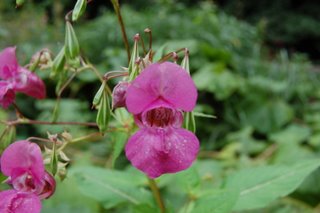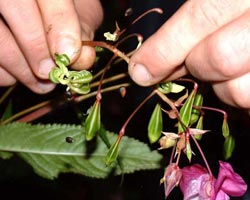
 Since 1839 the British Isles have been colonised by an attractive but highly invasive plant species. Victorian travellers to India brought the plant back to add to their gardens, but now it is to be found on most of our riverbanks. Walking beside rivers as I often do during the summer, it is not long before the tall stems of Himalayan Balsam are evident. It is a garden escape that has been particularly successful in its spread throughout the country. It is a tall, robust, annual producing clusters of purplish pink (or rarely white) helmet-shaped flowers. Also called Jumping Jack, Policeman’s Helmet, Indian Balsam and the “bee bum plant”. This last because when a bee enters the helmet shaped flower that is all one can see of the bee. It has the impressive Latin name of Impatiens glandulifera and is also the Noli-me-tangere plant – from the Latin for “Don’t touch me” because touching the seed pods at this time of year sends the seeds flying in all directions. Each plant can produce up to 800 seeds and can shoot them from the pods up to 7 metres away, which is why it is so successful in its dispersal.
Since 1839 the British Isles have been colonised by an attractive but highly invasive plant species. Victorian travellers to India brought the plant back to add to their gardens, but now it is to be found on most of our riverbanks. Walking beside rivers as I often do during the summer, it is not long before the tall stems of Himalayan Balsam are evident. It is a garden escape that has been particularly successful in its spread throughout the country. It is a tall, robust, annual producing clusters of purplish pink (or rarely white) helmet-shaped flowers. Also called Jumping Jack, Policeman’s Helmet, Indian Balsam and the “bee bum plant”. This last because when a bee enters the helmet shaped flower that is all one can see of the bee. It has the impressive Latin name of Impatiens glandulifera and is also the Noli-me-tangere plant – from the Latin for “Don’t touch me” because touching the seed pods at this time of year sends the seeds flying in all directions. Each plant can produce up to 800 seeds and can shoot them from the pods up to 7 metres away, which is why it is so successful in its dispersal.Since its introduction it has become naturalised, especially on riverbanks and increasingly in waste places and has become a problematical weed. Himalayan balsam tolerates low light levels and, in turn, tends to shade out other vegetation, impoverishing habitats. It is sometimes seen in gardens, either uninvited or grown deliberately, but care must be taken to ensure that it does not escape into the wild.
The eradication of the plant is widely encouraged, and usually the most appropriate method is by pulling up or cutting out plants before they flower and set seed. Conservation authorities regularly organise ‘balsam bashing’ work parties to clear the weed from marshland and riverbanks but their work has only managed to clear small areas. As the seeds remain viable for up to two years re-colonisation is commonplace.
As I said, it is an attractive plant and if it did not shade out our native flora I would otherwise be more pleased to see it.


2 comments:
the magic of internet is it removes the barrier, literally, the distance between the east and the west.....so i have reached your blog looking for something for my daughter's assignment, just want to say good day and more power !
No barriers here on my blog - thanks for visiting.
John
Post a Comment